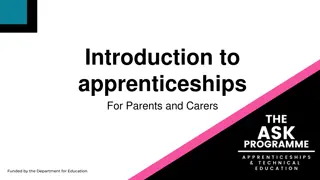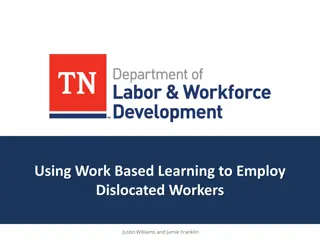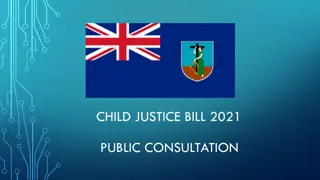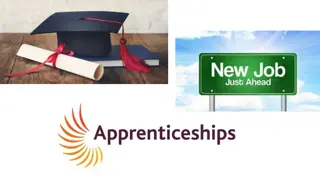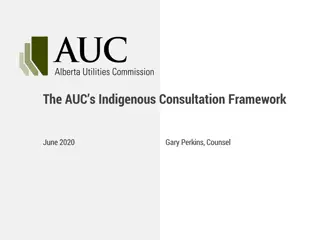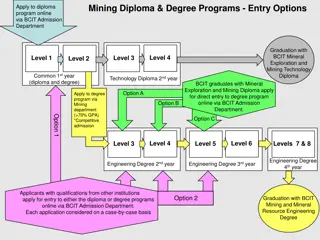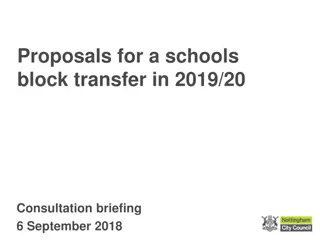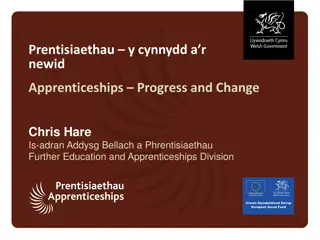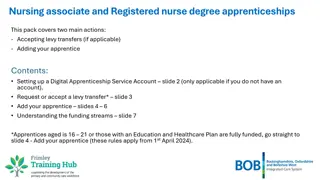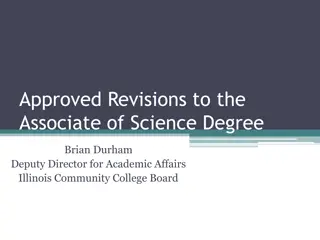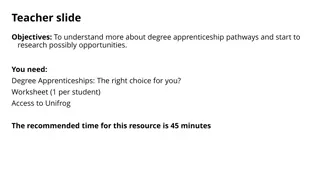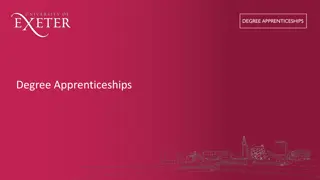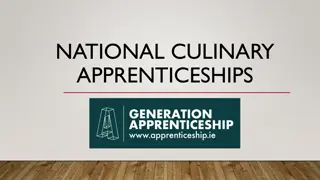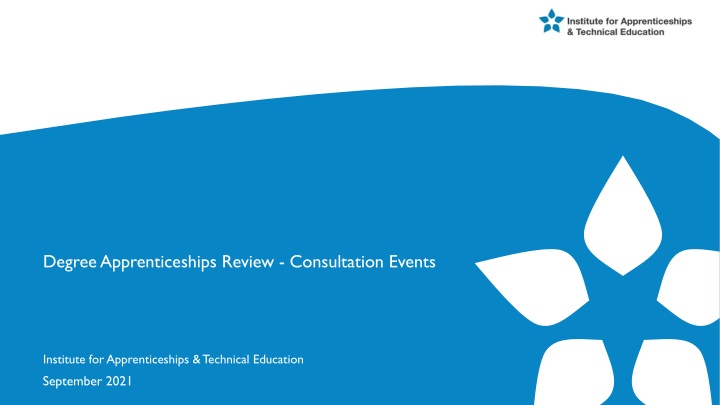
Degree Apprenticeships Review & Consultation for Improved Policy Development
"Join the Institute for Apprenticeships & Technical Education in shaping the future of degree apprenticeships. Learn about proposed changes to enhance recognition and integration of degrees within apprenticeship standards. Participate in the consultation process to have your say. Deadline: September 16, 2021."
Uploaded on | 2 Views
Download Presentation

Please find below an Image/Link to download the presentation.
The content on the website is provided AS IS for your information and personal use only. It may not be sold, licensed, or shared on other websites without obtaining consent from the author. If you encounter any issues during the download, it is possible that the publisher has removed the file from their server.
You are allowed to download the files provided on this website for personal or commercial use, subject to the condition that they are used lawfully. All files are the property of their respective owners.
The content on the website is provided AS IS for your information and personal use only. It may not be sold, licensed, or shared on other websites without obtaining consent from the author.
E N D
Presentation Transcript
Degree Apprenticeships Review - Consultation Events Institute for Apprenticeships & Technical Education September 2021
Purpose of this work The Institute is looking to change our existing policies that affect the development, approval and operation of degree apprenticeships. Although relatively technical in nature these changes are intended to: 1. Ensure that the Institute s policies and processes better recognise the role that degrees and graduate status play in the labour market; 2. Provide a comprehensive development and approval framework for the creation and revision of degree apprenticeships; and 3. Ensure that degree apprenticeships are a distinctive offer that secures the best of apprenticeships and the best of higher education. Overall we believe this will enable degree apprenticeships to better support the skills ambitions of employers, individuals and the nation.
How we will do it The consultation will be open until midnight on 16th September 2021 The intention is to implement the new policies in March 2022, with a notice period commencing in December 2021. Five specific changes are being proposed to our requirements of degree apprenticeships. Whilst these changes, in a technical sense, relate to what the Institute will be able to approve as a degree apprenticeship in the future, they are reflective of changes that we wish to see in the way that degree apprenticeships are designed, developed and delivered through new and more collaborative ways of working between employers, HE, other stakeholders and the Institute.
Proposed change one: We will amend our mandatory qualifications policy to recognise the currency of degrees, including where there are no specific subject discipline requirements for entry to an occupation. We will mandate degrees in apprenticeship standards that will be occupationally-specific, only in the case of graduate-entry occupations at level 6 and level 7. There will be no compulsion on employers to develop a degree apprenticeship if they do not want to (i.e. if they would prefer to develop an apprenticeship at level 6 or level 7 that does not lead to the award of a degree).
Proposed change two: Degrees within a degree apprenticeship will fully integrate with the on-the-job training and development that apprentices experience. This objective will inform the ways in which degree apprenticeships are developed by trailblazer groups, and we will also provide better guidance about how employers and training providers are expected to integrate training delivered on- and off-the-job. This reflects good practice already delivered in many degree apprenticeships, and we would like to make this the norm.
Proposed change three: In support of proposed change 2 we will require that the learning outcomes of any degree mandated in an apprenticeship standard will reflect the requirements of the occupation through alignment with the knowledge, skills and behaviours (KSBs) in the employer-specified occupational standard. As with proposed change 2, this is already best practice in some degree apprenticeships. This will require Higher Education Institutions (HEIs) to develop and validate degrees specifically aligned to the apprenticeship standard, noting that this may already be the case for some regulated occupations.
Proposed change four: Proposed changes 2 and 3 will align degree achievement and learning for occupational competence. As a result we will only approve degree apprenticeships where the end-point assessment (EPA) of occupational competence in a degree apprenticeship will integrate with the final assessment of the degree. The objective is to ensure that neither the degree nor the apprenticeship can be awarded in isolation from the other, with the EPA serving both.
Proposed change five: We will require the integrated EPA of all degree apprenticeships to include assessment by trained individuals with appropriate occupational and industry expertise. In line with existing good practice in many HEIs, this will assist with securing the occupational specificity of assessment by addressing the conflicts inherent in integrated degree apprenticeship assessment and drawing in an occupational perspective.
Current landscape of degree apprenticeships 50 integrated degrees 93 degree apprenticeships at L6 (70) and L7 (23) 134 apprenticeship standards at L6 (87) and L7 (47) 43 non- integrated degrees 41 non-degree apprenticeships Glossary: L6 educational level equivalent to a bachelor s honours degree L7 educational level equivalent to a master s degree Integrated degree apprenticeship where part or all of the end-point assessment and the assessment for the degree are the same assessment method. Integrated/blended learning where the training delivered for the degree and the training carried out on-the-job are systematically connected and interdependent (not formally a requirement in integrated apprenticeships currently).
If the current policy on mandated qualifications continued to be applied as is 18 Degree apprenticeships in a regulated occupation (19%) these would likely retain their mandated degrees 14 Degree apprenticeships have a professional body relationship (15%) some of these may retain their mandated degrees, possibly not all 61 Degree apprenticeships have mandated degrees for another reason (66%) the majority, if not all of these, would not retain their mandated degrees

